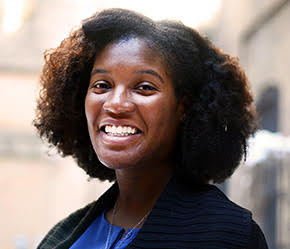Focus on a Provider: Dr. Kelita Fox
As a medical student at Wayne State University, rotating through the various specialties, Kelita Fox was immediately attracted to family medicine for its broad area of focus and its emphasis on care for people throughout the lifespan.
Her choice was sealed during a rotation in a Detroit emergency department, which made clear to her the profound need for primary care providers, particularly when it came to reproductive health. “Patients were using the emergency room as a primary care office,” says Fox. “It was plain to see the troubling effects of their lack of access to primary care.”
Fox saw an alarming number of patients who had come to the ER for pregnancy or sexually transmitted disease tests and who were not using a steady form of contraception. “They needed counseling about condoms, IUDs, and implants,” she says.
Fox had always viewed women’s health as an integral part of family medicine. But in medical school, she observed significant differences between providers who were comfortable providing this type of care and those who were not. Then, as she neared the end of her residency in Madison, Wisconsin, she was exposed to family physicians who did a particularly good job of integrating reproductive and sexual health into their practices. Fox wanted to become a truly outstanding reproductive health provider and began to look for a fellowship that would afford her a high volume of hands-on clinical experience under the supervision of excellent mentors.
RHAP’s Reproductive Health and Advocacy Fellowship, to which Fox was accepted, met those criteria, enabling her to work at the Institute for Family Health in Manhattan, where she would face no barriers in providing comprehensive contraceptive care.
RHAP fellows spend the first part of their fellowship honing their own skills. Then they begin training family medicine residents under the close observation of seasoned clinicians, including RHAP’s medical director, Linda Prine, whom Fox calls an “amazing women’s health advocate.” A central aim of the fellowship is to produce clinicians who are capable of multiplying the effect of their education. Now, a year after her fellowship and still working at the Institute, Fox has trained dozens of clinicians.
“Women want providers who are comfortable with the procedures they’re doing and know the correct language to use. In my first clinical assignments, I encountered patients who had had negative experiences with exams in other facilities. I wanted to be a provider who could provide that care well,” she says.
Almost every day, Fox has a patient who is seeking long-acting reversible contraception (LARC)—in other words, IUDs and implants. The expense of IUDs in particular means that some medical practices require patients to pay up front and then wait for the clinic to order it. “As most of us know, that is not an effective way to help women avoid pregnancy,” Fox says.
Since the end of her fellowship in the summer of 2014, Fox has been providing training in IUD and implant provision to residents, seasoned physicians, and nurse practitioners through RHAP’s Hands-On Reproductive Health Training Center.
“What does it mean to help women find the right birth control? It means being patient-centered, and that, as a physician, is one of my main goals. I really value providing women with contraception that fits their lifestyles and needs.”
For Fox, who came to New York City for the RHAP fellowship, the city is exerting a magnetic effect. Now the mother of a five-month-old boy (and a master of the subway system), she finds the city a perfect place to practice family medicine.
“At my health center there is an extremely diverse population, demographically, and socio-economically, so you learn to relate to patients of all walks of life, which is extremely important for a family physician,” she says.

